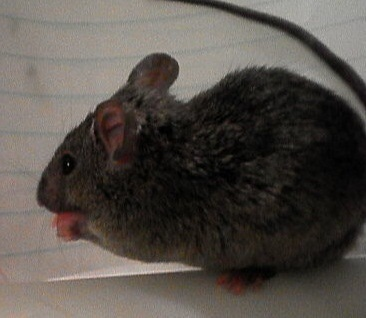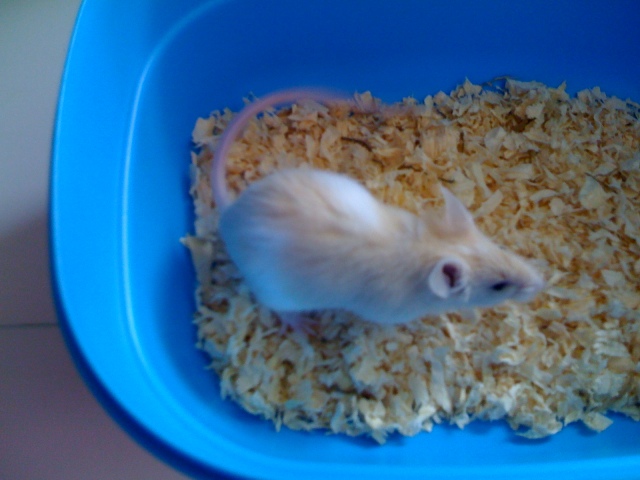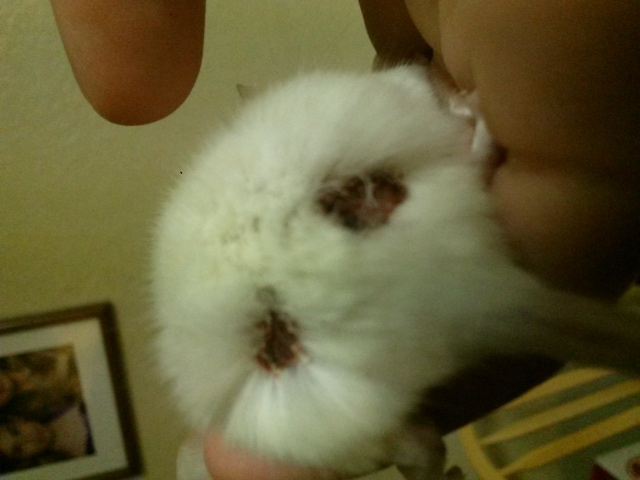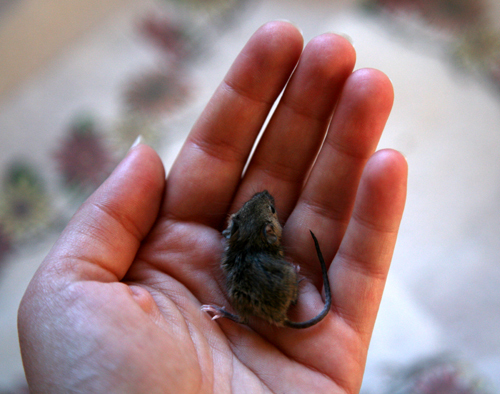QuestionQUESTION: Hi and happy new year, Tamarah,
I have a mouse that's seven months old now. All she does is scratch like crazy. This never used to be the case. I have her cage on my bed which is covered with a plastic shower curtain. I used to put a fleece blanket on top of the curtain but now I don't because mites and other microbes can easily attack themselves to fleece and infest it.
I think my bed may be the source of the infestation but I'm not sure now. I brushed diatomaceous earth all over the bed and drawers underneath. Left it for 48 hours then vacuumed the left over powder. Cleaned all linen in hot water and dried it at the highest temperature.
Delilah has gotten a dose of Selamectin and Ivermectin at different times and neither has worked for her, which is pretty amazing seeing how Selamectin has always worked for my mice in the past.
I've noticed hair is missing around her eyes and other spots where she scratches, and the area under her right ear is a particular problem. You can see it in the picture.
I even went to far as to get lab bedding which is sanitized at 380 degrees. What am I doing wrong? Could this be "fungal"? I lost my Fluffy to whatever this is because she almost ate off her tail and had to be put to sleep. The only common denominator between the two is my bed. Even if I keep Delilah off my bed and in her cage, she's still scratching. Vets are expensive and seem clueless, following a "let's-try-this" approach to medicine. It's ridiculous. They know more about birds.
I don't know what to do but I don't want to see my little girl consumed with scratching. She needs to enjoy her life already. Please help.
Thanks.
ANSWER: Hi Ozne,
Has she actually seen a vet for her scratching? There is a very simple, easy test that is done for scratching - a skin scrape. A small blade is used to brush off a few skin cells, then those cells are viewed under a microscope. A vet will have to be very confident scruffing and immobilizing a mouse to do the test, but the actual microscope viewing will definitively tell you what is causing the itching. Perhaps they are ruling out causes one by one because they do not want to risk injuring her with the sharp tool.
Possible causes include: mites, lice, allergies, fungal infections like ringworm, a reaction to a new product (contact dermatitis), or a neurotic tic. That's pretty much in the correct order from most likely to least likely, in fact.
Mites, lice, and other skin parasites should all have been affected by the selamectin. Sometimes mice can pick up the mites again from bedding or absorbent items in the cage, if the cage is not bleached out and thoroughly rinsed at the time of treatment. All other mice in the cage need treated at the same time, and any kind of new bedding can be frozen for 24 hours before use to kill any mites that may have been picked up. The thing that strikes me as odd is that as long as the selamectin was administered correctly (one drop of kitten dose to the back of the neck, left to dry, cage and others handled at the same time), it should have been good for up to a month without reapplication. That means if it is mites, the only way she could still be scratching is if the scabs were too itchy during healing, and now she just won't leave it alone as a result. That might be able to be helped with a tiny dab of triple antibiotic ointment to the affected area a couple of times a day to both soothe and protect broken skin as it heals.
Fungal infection is possible, but I can't confirm that from your photo. I can tell you that ringworm is highly contagious, so if you've been handling her a lot and haven't gotten any itchy spots of your own, that might not be the issue. Look for yellowish crusts, but again, the best person to confirm that is a vet. You should be able to find over the counter antifungals, though I don't know what amounts might be safe for mice. If you end up wanting to treat for ringworm, and don't think the vet will help you out, please write me back and I will find that info for you. :)
Allergies are another possibility, as well as contact dermatitis. A lot of things have changed since she started scratching, but did anything change right before? New diet, perhaps, or a different sort of bedding? New hand lotion, detergent for your bed, or anything like that? Since it's localized and not all over, this isn't the most likely cause, but it's of course a possibility.
A neurotic tic would emerge as a result of stress, if a new mouse recently joined your home, or if something changed significantly in her environment. New noises, drafts, or suddenly leaving the light on overnight or always off can all impact her world, and sometimes stress causes a mouse to scratch obsessively at one spot. However, other than normalizing her environment, there isn't a way to treat a tic, so my suggestion would be to focus more on the other possible causes first.
How long has this been going on? Hopefully some of this information helps, but please do write me back if you want to discuss it further and get help narrowing it down.
-Tam
---------- FOLLOW-UP ----------
QUESTION: Hi Tam,
Delilah has been scratching for over a month now. What gets me is, how can she continue scratching after a dose of both Iver and Selamectin? That rash under her right ear is worrisome because I don't want it to bleed.
I will have to make an appointment with the vet at the local Humane Society but he's not always in so I have to be prepared to do a home treatment just in case. I've read that some hamster owners use Clotrimazole (1%) to treat fungus or ringworm. I don't know how safe the stuff is in case she ingests it. Can you suggest anything else based on what I've given her already?
It's 15 degrees today so I don't want to get her wet with another application of coconut oil and colloidal silver. Also, it's very hard to touch that area under her right ear because she moves around a lot and if I press the issue, she squeaks as if I hurt her because she doesn't want to be touched. Delilah is like an Indy 500 car. She's fast and slinky.
Thanks.
P.S. I spoke to a pharmacist at the local compounding pharmacy to see if they could make an "edible" Clotrimazole but he said their gel bases are mostly alcohol which is the same as the over the counter stuff.
AnswerAs I mentioned before, mite treatments must be done correctly to be effective, so only you can guess why the selamectin and ivermectin did not work. To be effective against mites, all of the following should be done at the same time:
-Selamectin applied via one drop of kitten formula to the back of the neck and allowed to dry before grooming
-Selamectin applied to all mice in the room
-The cage bleached and thoroughly rinsed, as well as all nonporous surfaces, with porous surfaces being either boiled, baked, or discarded
-Bedding replaced with safe bedding (no pine or cedar) that has been frozen for 24 hours prior to use
-Any other surfaces she spends significant time on, like your bed, treated at the same time.
-Repeat applications as suggested on the product - I believe selamectin is once per month.
If all of these were done, and the problem was mites, you should have seen improvement in itching immediately and improvement in fur growth and skin irritation within the first few days to a week. It's also possible that she could have a skin infection as a result of scratching, even if she doesn't still have mites.
Coconut oil does not heal infections, no matter what folks say. I've also never heard of using colloidal silver, and a lot of sources when I went looking for it seem to imply it is not as useful as one might hope. I would discontinue use of both while we are looking for irritants, so that we don't accidentally make things worse by making her uncomfortable. The only thing I would suggest applying to that part of her face would be triple antibiotic ointment, and only if the skin is broken.
I'm a little hesitant to suggest treating for ringworm if there are no other implications that it is what it is, since that area is right by her eye, and I don't know the safety of clotrimazole (or any of the other antifungal topical medications, as there are many, and even some antibiotics will eliminate fungal infections) in the eye or mouth. Is the area crusted? Crusting is a pretty big sign of fungal involvement, as is the crustiness or irritation appearing elsewhere or even on you/other mice. As I think I said before, ringworm is highly contagious, and while not always symptomatic, a month long infection would surprise me if it didn't show up anywhere else.
My suggestion is to keep it simple until you see the vet. Treat one thing at a time, and leave out the anecdotal treatments. I know it seems silly to rule things out one by one, but it's the fastest way to go about things without just doing a skin scrape. If you can't get in with your vet and you can successfully and definitively rule out mites/lice, let me know, and I will chat with some of my mouse friends and see what the consensus is on an effective and safe OTC antifungal that comes best recommended for the face area.
Keep me in the loop,
-Tam

 sneezing mouse!
Question
mousey mousey
I got my first mous
sneezing mouse!
Question
mousey mousey
I got my first mous
 Mouse still sick after tetracycline
QuestionRuby and Rogue
QUESTION: Hi Natasha,
Th
Mouse still sick after tetracycline
QuestionRuby and Rogue
QUESTION: Hi Natasha,
Th
 frightened mouse
Question
My mouse
Hi Natasha,
Two days ago, I bought
frightened mouse
Question
My mouse
Hi Natasha,
Two days ago, I bought
 HELP my mouse has red scabs near her tail.
Question
Scabs
My pet mouse has two red scabs ne
HELP my mouse has red scabs near her tail.
Question
Scabs
My pet mouse has two red scabs ne
 naughty baby wild mice nipping
QuestionQUESTION: By the time I get an answer to this o
naughty baby wild mice nipping
QuestionQUESTION: By the time I get an answer to this o